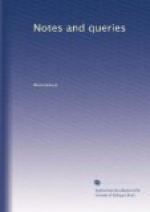S.H.H.
Histoire des Sevarambes (Vol. iii., p. 4.).—On the subject of the authorship of this work I will transcribe a note which I subjoined to a short account of Isaac Vossius (Worthington’s Diary, p. 125):—
“Whether the History of the Sevarites, of Sevarambi by Captains Thomas Liden, published in two parts (London, 1675-9, 12mo.), which is one of the ablest of the fictions written after the model of More’s Utopia, and which has been ascribed to Isaac Vossius by J.A. Fabricius, be his, is a point yet unsettled. On a careful consideration of the internal evidence, and a comparison with his avowed publications, so far as such a comparison can be made between works so dissimilar in character, I incline to the conclusion that this tract is justly ascribed to Isaac Vossius.”
On a reconsideration of the subject, I see no reason to alter this opinion. Morhof, who always attributed it to Isaac Vossius (see Polyhistor, vol. i. p. 74., edit. 1747), was thoroughly versed in the literary history, including the English, of the period, and was not likely to have been mistaken. Vossius lived in England from 1670 to 1688, when he died. I have seen several English letters of his, though his general correspondence was in Latin or French, and he seems quite able to have written it, as far as the language is concerned. Vairasse appears to have translated it into French but to have had no other part in it. I may observe, that the publication in English, London, 1738, is a retranslation from the French, not a reprint of the original work of 1675-9.
JAMES CROSSLEY.
Verses attributed to Charles Yorke (Vol. ii., p. 7.; and Vol. iii., p. 43.).—These lines, “Stript to the naked soul,” have been frequently printed, indeed so lately as in Lord Campbell’s Lives of the Chancellors, at the end of the Life of Charles Yorke, as his, but without any observation. What is most singular is, that the excellent editor of Bishop Warburton’s Literary Remains has overlooked the fact that they are driven in that prelate’s correspondence with Bishop Hurd as Pope’s. (See Letters, p. 362., edit. 1809, 8vo.) Warburton observes, “The little poem is certainly his.” He remarks in a letter to Yorke—
“You have obliged me
much (as is your wont) by a fine little poem of my
excellent and endeared friend,
Mr. Pope, and I propose to put in into
use.”—Letters
from Warburton to C. Yorke. 1812, 4to. p. 64.
Warburton then gave them to Ruffhead, who inserted them in his Life of Pope, from which they were transferred in Bowles’s editions of Pope’s Works (vol. ii. p. 406), and in the supplementary volume to Pope’s Works (1807, 4to.). The extraordinary circumstance is, that they had appeared as far back as 1753 in the miscellaneous works of Aaron Hill, published in 1753, in 4 vols. 8vo., and are included in that collection as his own. Roscoe observes (Life of Pope, in vol. i. of his edition of Pope’s Works, p. 361., edit. 1824), without, however appearing to have been fully acquainted with the facts of the case:




